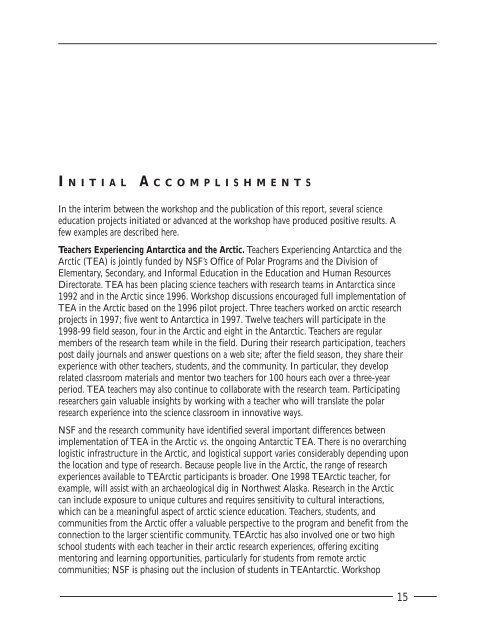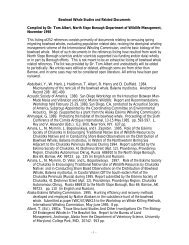ed report 4 page cover - Arctic Research Consortium of the United ...
ed report 4 page cover - Arctic Research Consortium of the United ...
ed report 4 page cover - Arctic Research Consortium of the United ...
You also want an ePaper? Increase the reach of your titles
YUMPU automatically turns print PDFs into web optimized ePapers that Google loves.
I N I T I A L A C C O M P L I S H M E N T S<br />
In <strong>the</strong> interim between <strong>the</strong> workshop and <strong>the</strong> publication <strong>of</strong> this <strong>report</strong>, several science<br />
<strong>ed</strong>ucation projects initiat<strong>ed</strong> or advanc<strong>ed</strong> at <strong>the</strong> workshop have produc<strong>ed</strong> positive results. A<br />
few examples are describ<strong>ed</strong> here.<br />
Teachers Experiencing Antarctica and <strong>the</strong> <strong>Arctic</strong>. Teachers Experiencing Antarctica and <strong>the</strong><br />
<strong>Arctic</strong> (TEA) is jointly fund<strong>ed</strong> by NSF’s Office <strong>of</strong> Polar Programs and <strong>the</strong> Division <strong>of</strong><br />
Elementary, Secondary, and Informal Education in <strong>the</strong> Education and Human Resources<br />
Directorate. TEA has been placing science teachers with research teams in Antarctica since<br />
1992 and in <strong>the</strong> <strong>Arctic</strong> since 1996. Workshop discussions encourag<strong>ed</strong> full implementation <strong>of</strong><br />
TEA in <strong>the</strong> <strong>Arctic</strong> bas<strong>ed</strong> on <strong>the</strong> 1996 pilot project. Three teachers work<strong>ed</strong> on arctic research<br />
projects in 1997; five went to Antarctica in 1997. Twelve teachers will participate in <strong>the</strong><br />
1998-99 field season, four in <strong>the</strong> <strong>Arctic</strong> and eight in <strong>the</strong> Antarctic. Teachers are regular<br />
members <strong>of</strong> <strong>the</strong> research team while in <strong>the</strong> field. During <strong>the</strong>ir research participation, teachers<br />
post daily journals and answer questions on a web site; after <strong>the</strong> field season, <strong>the</strong>y share <strong>the</strong>ir<br />
experience with o<strong>the</strong>r teachers, students, and <strong>the</strong> community. In particular, <strong>the</strong>y develop<br />
relat<strong>ed</strong> classroom materials and mentor two teachers for 100 hours each over a three-year<br />
period. TEA teachers may also continue to collaborate with <strong>the</strong> research team. Participating<br />
researchers gain valuable insights by working with a teacher who will translate <strong>the</strong> polar<br />
research experience into <strong>the</strong> science classroom in innovative ways.<br />
NSF and <strong>the</strong> research community have identifi<strong>ed</strong> several important differences between<br />
implementation <strong>of</strong> TEA in <strong>the</strong> <strong>Arctic</strong> vs. <strong>the</strong> ongoing Antarctic TEA. There is no overarching<br />
logistic infrastructure in <strong>the</strong> <strong>Arctic</strong>, and logistical support varies considerably depending upon<br />
<strong>the</strong> location and type <strong>of</strong> research. Because people live in <strong>the</strong> <strong>Arctic</strong>, <strong>the</strong> range <strong>of</strong> research<br />
experiences available to TE<strong>Arctic</strong> participants is broader. One 1998 TE<strong>Arctic</strong> teacher, for<br />
example, will assist with an archaeological dig in Northwest Alaska. <strong>Research</strong> in <strong>the</strong> <strong>Arctic</strong><br />
can include exposure to unique cultures and requires sensitivity to cultural interactions,<br />
which can be a meaningful aspect <strong>of</strong> arctic science <strong>ed</strong>ucation. Teachers, students, and<br />
communities from <strong>the</strong> <strong>Arctic</strong> <strong>of</strong>fer a valuable perspective to <strong>the</strong> program and benefit from <strong>the</strong><br />
connection to <strong>the</strong> larger scientific community. TE<strong>Arctic</strong> has also involv<strong>ed</strong> one or two high<br />
school students with each teacher in <strong>the</strong>ir arctic research experiences, <strong>of</strong>fering exciting<br />
mentoring and learning opportunities, particularly for students from remote arctic<br />
communities; NSF is phasing out <strong>the</strong> inclusion <strong>of</strong> students in TEAntarctic. Workshop<br />
15




